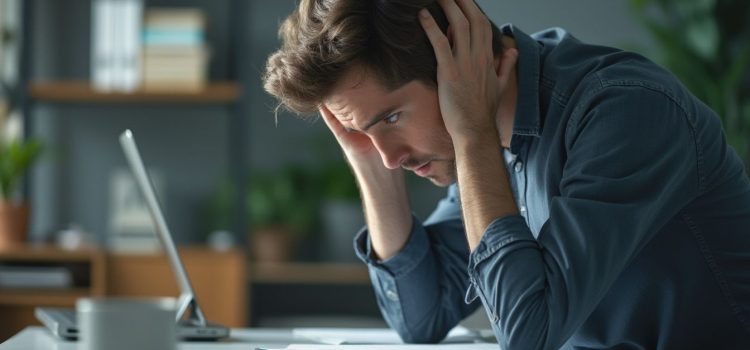

This article is an excerpt from the Shortform book guide to "The Master Guides: Understand and Overcome Anxiety" by Shortform. Shortform has the world's best summaries and analyses of books you should be reading.
Like this article? Sign up for a free trial here.
What’s happening in your body when anxiety takes hold? How does overthinking create a cycle that affects both your mind and body?
Anxiety isn’t just an emotional experience—it triggers a complex chain reaction throughout your entire system. From elevated stress hormones to disrupted bodily functions, the effects of anxiety on health can be far-reaching and significant.
Read on to explore how anxiety impacts physical well-being, influences thought patterns, and shapes daily habits.
The Effects of Anxiety on Health
The anxiety that stems from overthinking negatively affects your mental and physical health. We’ll explore three negative effects of anxiety on health:
- It elevates your stress levels.
- It fuels irrational and unproductive thoughts.
- It spawns unhealthy habits.
Negative Effect #1: Anxiety Elevates Stress Levels
Robert Sapolsky (Why Zebras Don’t Get Ulcers) argues that there’s a significant link between anxiety and heightened stress levels. He explains that, for most of our evolutionary history, our main sources of stress were short-lived physical stressors that required an intense fight-or-flight physiological response to survive. As such, your body is hardwired to respond intensely to anything that triggers stress.
In the modern world, however, your main source of stress comes from ongoing mental stressors like anxieties about work or relationships. These anxieties stimulate your body’s stress response, and your body doesn’t distinguish between immediate physical stressors and ongoing mental stressors. It reacts to all stressors as if you’re in immediate physical danger by releasing stress hormones that provide a burst of energy and prepare your body to fight, flee, or freeze.
Reacting to real physical danger burns through these stress hormones and leaves no trace of them in your body. However, since mental stressors rarely put you in physical danger, you don’t burn through these stress hormones—instead, they linger in your body.
The more anxious you feel, the more you keep your body in a heightened state of stress, accumulating stress hormones that interfere with your body’s ability to regulate itself. This imbalance can disrupt many bodily systems such as your cardiovascular system, metabolism, immune system, and brain function.
Negative Effect #2: Anxiety Fuels Irrational Thoughts and Emotions
In addition to disrupting key bodily systems, Daniel Goleman explains that anxiety-induced stress impairs rational thinking. Each time you trigger your body’s stress response, your brain prioritizes instinctual survival responses to guide you toward safety. Alongside creating a physical response, this process shuts down the parts of your brain responsible for conscious thought and problem-solving, which hinders your ability to take control of your thoughts, emotions, and behaviors in the moment.
Dale Carnegie offers a slightly different take on how anxiety hinders your ability to exercise self-control: Your anxieties create mental burdens that overwhelm you, create fatigue, and distract you from focusing productively. As a result, you become more prone to irrational thoughts that make small concerns appear more serious than they are—which in turn exacerbates your feelings of anxiety and stress.
Negative Effect #3: Anxiety Spawns Unhealthy, Stress-Inducing Habits
Because anxiety and stress feed off of each other, creating a self-reinforcing cycle, they often lead to two types of habits that exacerbate anxiety—unhealthy habits (like smoking or overeating) and avoidance.
Judson Brewer explains that unpleasant feelings associated with anxiety elicit harmful stress-relief habits—for instance, smoking, drinking, gambling, overeating, or shopping—that lead to even more anxiety and stress. While these habits may provide short-term relief, they don’t eliminate feelings of anxiety or stress, just temporarily dull them. Relying on such habits to avoid your unpleasant feelings only adds to your existing anxieties.
For example, you feel anxious about your marriage and try to suppress your feelings by drinking excessively. Your heavy drinking negatively affects your marriage and leads to health issues like liver damage. As a result, you feel even more anxious about your marriage and you feel anxious about how your heavy drinking might be harming you.
Another way you might exacerbate your anxiety is by avoiding situations that make you feel anxious. Health psychologist Kelly McGonigal (The Upside of Stress) explains that avoidance creates the same effects as engaging in harmful stress-relief habits: It reinforces your current anxieties and creates new anxieties. For example, you feel anxious about not being a good enough partner, so you avoid romantic relationships. Because you avoid dating anyone, you isolate yourself and reinforce your anxiety about not being good at relationships. Your loneliness then spawns new anxieties about the prospect of facing the future alone.

———End of Preview———
Like what you just read? Read the rest of the world's best book summary and analysis of Shortform's "The Master Guides: Understand and Overcome Anxiety" at Shortform.
Here's what you'll find in our full The Master Guides: Understand and Overcome Anxiety summary:
- A compilation of research and methods from a range of experts on anxiety
- A look at what causes anxiety and how it affects your physical and mental health
- Five actionable strategies for breaking the cycle of anxious tendencies






